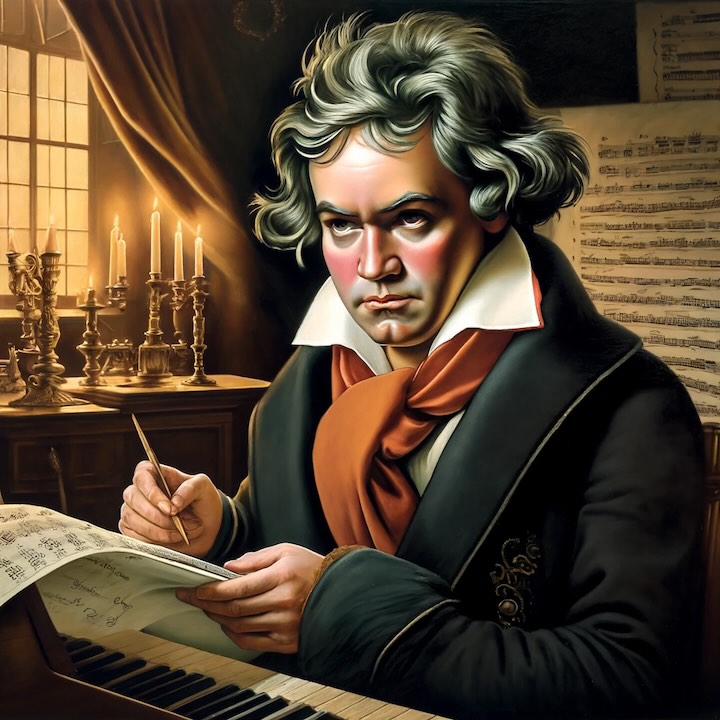Ludwig van Beethoven (1770-1827)

One of the most important figures in the history of classical music, German composer Beethoven achieved immortality through his glorious creations. Though often ill and suffering from progressive deafness, Beethoven managed to produce an extraordinary body of musical literature in forms ranging from concertos to symphonies, string quartets to opera. Some of his most popular works include the Eroica Symphony, Fidelio, the Diabelli Variations,and the Choral Symphony (no. 9).
Ludwig van Beethoven, born in December 1770 in Bonn, Germany, is one of the most celebrated and influential composers in the history of Western classical music. His compositions are revered for their emotional depth, structural innovation, and profound impact on the development of music. Beethoven's life was marked by both extraordinary musical achievement and personal struggle, particularly his battle with hearing loss, which began in his late 20s and eventually led to complete deafness.
Beethoven was born into a musical family. His father, Johann van Beethoven, was a court musician and recognized his son's talent early on, hoping to mold him into a child prodigy like Wolfgang Amadeus Mozart. Johann subjected Ludwig to rigorous and often harsh training, which instilled in him both a deep understanding of music and a lifelong passion for composition. By the age of seven, Beethoven was already performing publicly, and by his teens, he had secured a position as an assistant organist at the court of Bonn.
In 1792, Beethoven moved to Vienna, the cultural capital of Europe at the time, to study under Joseph Haydn, one of the leading composers of the era. Though their relationship was sometimes strained, Haydn’s influence on Beethoven was significant, particularly in the development of his early compositional style. Vienna remained Beethoven’s home for the rest of his life, where he quickly gained a reputation as a virtuoso pianist and an innovative composer.
Beethoven’s early compositions were firmly rooted in the Classical tradition established by composers like Haydn and Mozart. However, as he matured, Beethoven began to push the boundaries of musical form and expression. This period of his life, known as his "middle period," or "heroic period," saw the creation of some of his most famous works, including the "Eroica" Symphony (Symphony No. 3), the "Fifth Symphony," and the "Appassionata" Sonata.
During this time, Beethoven's music became more dramatic and emotionally charged, reflecting both his personal struggles and his broader vision for what music could achieve. The "Eroica" Symphony, for example, was originally dedicated to Napoleon Bonaparte, whom Beethoven admired as a champion of freedom and equality. However, when Napoleon declared himself emperor, Beethoven famously tore up the dedication, disillusioned by the leader’s betrayal of the revolutionary ideals.
Tragically, Beethoven began to lose his hearing in his late 20s, a condition that worsened over time. By the time he was in his mid-40s, he was almost completely deaf. This affliction was a devastating blow to Beethoven, who had relied heavily on his ability to hear and perform music. Despite this, he continued to compose, producing some of his most extraordinary works during his later years.
Beethoven’s "late period" is characterized by compositions that are more introspective and complex, including the "Ninth Symphony," the "Late String Quartets," and the "Missa Solemnis." The "Ninth Symphony," with its famous "Ode to Joy" finale, is particularly significant, as it was composed when Beethoven was completely deaf. The symphony’s themes of universal brotherhood and triumph over adversity have made it one of the most enduring works in the Western classical canon.
Beethoven died on March 26, 1827, in Vienna. His funeral was attended by thousands, reflecting his status as one of the most important cultural figures of his time. Beethoven’s influence on music is immeasurable. His works bridged the Classical and Romantic eras, pushing the boundaries of musical form, harmony, and expression. Composers such as Brahms, Wagner, and Mahler drew inspiration from his innovations, and his music continues to be performed and celebrated around the world.
Beethoven’s ability to overcome personal adversity, particularly his deafness, and continue to create music of profound depth and beauty, makes him a symbol of resilience and artistic integrity. His legacy endures not just in the notes of his compositions, but in the hearts of those who continue to be moved by his extraordinary music.
 >
>